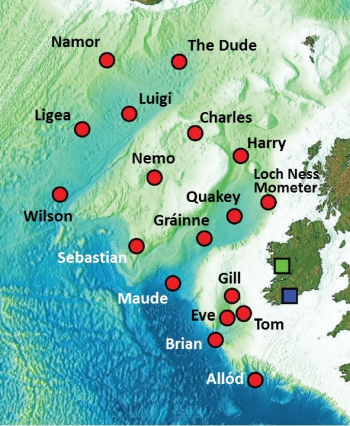iCRAG scientists Dr Sergei Lebedev, Clara Gomez Garcia and Laura Berdi have set sail on the RV Celtic Explorer as part of the SEA-SEIS research cruise.
As the expedition set sail, the crew of iCRAG, DIAS and Marine Institute scientists are conscious that people in Ireland and around the world find themselves in isolation and confined to their houses. The SEA-SEIS scientists are also in isolation, but in a different setting. They are spending the next three weeks on board the RV Celtic Explorer of the Marine Insitute in the middle of the North Atlantic Ocean. As with all research cruises, safety is the number one priority and particularly now during the Covid-19 pandemic. The iCRAG scientists, Marine Institute, DIAS and the SEA-SEIS team have taken extensive precaution in advance of departure, including being in near isolation for the last 2 weeks, and being transported to the port by a private bus that picked each one of the DIAS and iCRAG scientists at their houses. Strict protocols have been introduced on the ship, with all cabins private, PPE and disinfectants provided for all crew, staggered meal times, and non-essential parts of the ship closed.
The ocean-bottom seismometers are sophisticated devices able to operate at huge pressures at the bottom of the ocean (SEA-SEIS has deployed them at depths from 1 to 4 km). When released from the ship, they sink and install themselves on the seafloor. When the deployment is finished, the ship comes back and sends an acoustic signal to the seismometers. Having received it, they detach from their anchor and ascend slowly to the surface of the sea. The seismometer, data logger and the battery are all within a titanium pressure tube, protecting them from the pressure. The tube is fixed within the shock resistant foam shell (orange) that makes the instrument buoyant once the anchor is detached.
First deployed in 2018, the crew now return to pick up the seismometers which, all things going well, have just floated to the surface.
The ocean-bottom seismometers are provided by iMARL, the “Insitu Marine Laboratory for Geosystems Research” hosted by DIAS. The RV Celtic Explorer is run by the Marine Institute. The SEA-SEIS project is co-funded by the Science Foundation Ireland, the Geological Survey of Ireland, and the Marine Institute.
For more info visit https://sea-seis.ie/ and follow SEA-SEIS on Twitter and Instagram.




